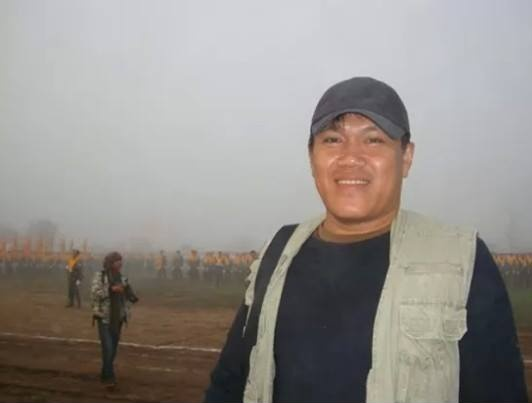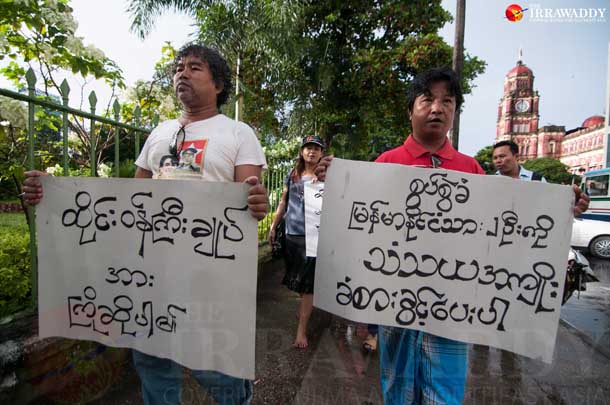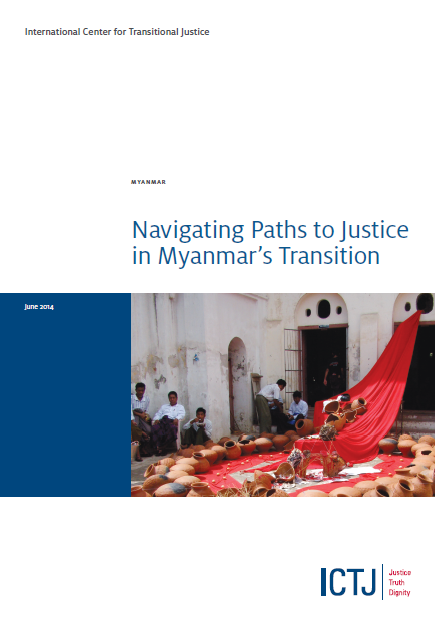Posts Tagged ‘Min Aung Hlaing’ (5 found)
Kachin National Organization (KNO) Condemns Rape and Murder of Two Kachin Teachers and Calls for Inqury on Crime against Humanity
KNO strongly condemned the rape and brutal murder of Maran Lu Ra (20 years old) and Tangbau Hkawn Nan Tsin (21 years old), who were volunteer teachers of the Kachin Baptist Convention’s Education Ministry Program. They were gang-raped, severely tortured and murdered in Kawng-Hka village, Nam Tau, Mung Mau district in Northern Shan State by Burma Army soldiers from 503 Light Infantry Regiment, commanded by Major Aung Soe Myin, stationed at the village since 17th January 2015. […]
• • •ဗုိလ္ခ်ဳပ္မွဴးႀကီး မင္းေအာင္လႈိင္၊ ကာကြယ္ေရးဦးစီးခ်ဳပ္ထံသုိ႔ အိတ္ဖြင့္ေပးစာ- Open Letter to Senior General Min Aung Hlaing
တပ္မေတာ္၏ စစ္ဆင္ေရးမ်ားႏွင့္ အသစ္တစ္ဖန္ျဖစ္ပြားလ်က္ရွိေသာ ျပင္းထန္သည့္ တုိက္ခုိက္မႈမ်ားအေပၚ အမ်ားျပည္သူ အေနျဖင့္ စုိးရိမ္ပူပန္မႈႀကီးစြာ ျဖစ္လ်က္ရွိၿပီး ထုိအေျခအေနမ်ားေၾကာင့္ အမ်ဳိးသားျပန္လည္ သင့္ျမတ္ေရးႏွင့္ တပ္မေတာ္၏ အကူအညီျဖင့္ ေဆာင္ရြက္လ်က္ရွိေသာ လက္ရွိအစုိးရ၏ ျပဳျပင္ေျပာင္းလဲ ေရးလုပ္ငန္းမ်ားအေပၚ ယံုၾကည္မႈကုိ မ်ားစြာ ပ်က္ျပားေစႏုိင္ပါသည္။ […]
• • •Justice for the Killing of Journalist by Burma Army Must be Found
 News of the murder of a journalist by the Burma Army while being held in custody should send shockwaves across the country and beyond, but sadly it is not much of a surprise for those who are aware of the abusive nature of the most powerful institution in Burma. What will transpire next will be a clear indicator of the Government’s will to pursue justice and end the impunity that the Burma Army has enjoyed for so long. Not many are optimistic.
News of the murder of a journalist by the Burma Army while being held in custody should send shockwaves across the country and beyond, but sadly it is not much of a surprise for those who are aware of the abusive nature of the most powerful institution in Burma. What will transpire next will be a clear indicator of the Government’s will to pursue justice and end the impunity that the Burma Army has enjoyed for so long. Not many are optimistic.
Aung Kyaw Naing, also known as Ko Par Gyi, was a freelance journalist covering the recent clashes in eastern Burma between the Democratic Karen Benevolent Army (DKBA) and the Burma Army and its’ proxy Border Guard Force (BGF). After visiting Kyaikmayaw, Mon State, the scene of heavy clashes in September 2014, Ko Par Gyi went missing. His wife, Ma Than Dar, began to search for him and held a press conference on 21 October in Rangoon stating that he was being held in custody by the Burma Army and demanded his immediate release. Just a few days later, a statement was issued to the Myanmar Press Council (Interim) by an aide to commander-in-chief of the armed forces, Min Aung Hlaing, that detailed Ko Par Gyi’s death while in custody. The statement claims that Ko Par Gyi was a captain for the Klohtoobaw Karen Organization (KKO), the political wing of the DKBA, and was shot dead while trying to escape. The DKBA has denied that Ko Par Gyi was indeed a member of their organization […]
• • •Smattering of Rangoon Protesters Greet Thai PM Over Koh Tao Murder Case
 RANGOON — A smattering of Burmese activists held two days of protests against the arrest of a pair of Burmese migrants accused of murdering two tourists on southern Thailand’s Koh Tao island last month, as Thai Prime Minister Prayuth Chan-ocha arrived in Rangoon on Friday for the second day of his first overseas trip since taking the helm of the military-ruled country.
RANGOON — A smattering of Burmese activists held two days of protests against the arrest of a pair of Burmese migrants accused of murdering two tourists on southern Thailand’s Koh Tao island last month, as Thai Prime Minister Prayuth Chan-ocha arrived in Rangoon on Friday for the second day of his first overseas trip since taking the helm of the military-ruled country.
A group of about 20 Burmese led by the Movement for Democracy Current Force held a protest and prayer vigil at downtown Rangoon’s Sule Pagoda on Thursday evening, holding placards that urged the former general turned prime minister “to let the accused two Burmese receive the benefit of the doubt.” […]
• •Navigating Paths to Justice in Myanmar’s Transition
Since President Thein Sein and his government took office in 2011, Myanmar’s transition has unfolded at a pace that has surprised many and earned the acclaim of western governments, financial institutions, and private-sector investment analysts.1 The Burmese population of approximately 60 million has endured more than a half-century of military dictatorship, armed conflict, economic dysfunction, and political repression.2 A meaningful transformation into a peaceful society that enjoys economic development and functions democratically now seems plausible, though it is far from guaranteed. Ultimately, the blanket immunity afforded by the 2008 Constitution shields the acts attributable to prior regimes from any form of accountability.3 Whether the reform process will evolve to include measures that address the massive and systematic injustices of the past remains less certain.
• • •









 All posts
All posts